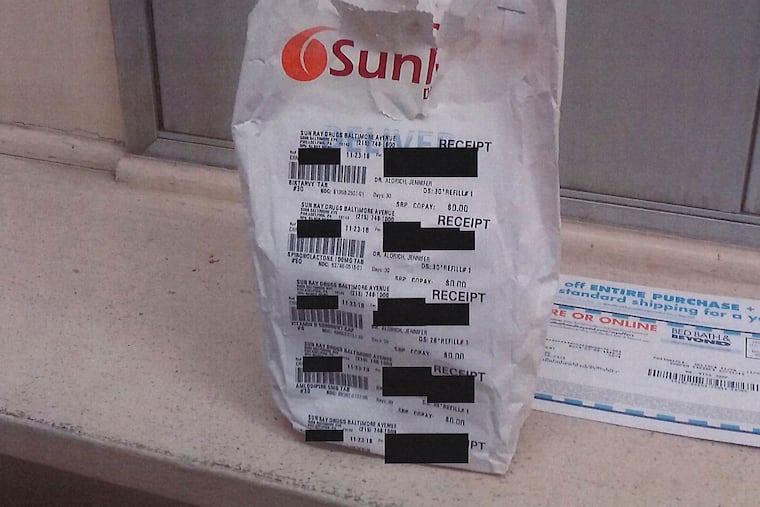HIV and gender-transition meds delivered in labeled bag; suit says Philadelphia woman stigmatized
The woman's neighbors now are "cold and distant," to the point that she wants to move.

A pharmacy delivered a West Philadelphia woman’s drugs for gender transition and HIV treatment to the mail room of her apartment building, violating her privacy and resulting in stigma from neighbors, the AIDS Law Project of Pennsylvania alleges in a lawsuit filed on Monday.
On previous occasions, the woman’s prescription medicines from SunRay Drugs on West Baltimore Avenue had been wrapped in unmarked brown paper bags. But on Nov. 27, 2018, the package exterior was labeled with the names of the drugs and left on a shelf for all building inhabitants to see, according to the complaint.
Her neighbors, once friendly, now are “cold and distant," avoiding her in common areas and gossiping behind her back. She once overheard several neighbors in the laundry room discussing “the drag queen with AIDS,” according to the lawsuit, filed in Common Pleas Court.
More than 35 years after the discovery of HIV, there should be no stigma attached to the virus, said Ronda B. Goldfein, an attorney and executive director of the nonprofit group that filed the complaint. Yet the woman’s treatment by her neighbors illustrates that such stigma persists, she said.
Identified only as Jane Doe in the complaint, she previously had disclosed her HIV-positive status and gender history only to close friends. That decision turns out to have been justified, said Goldfein, who is married to an Inquirer editor, David Lee Preston.
“When that word gets out, you never put that word back,” she said. “That person is forever suffering the consequences of losing control of their information and not knowing where it goes next.”
In response to a phone call from the AIDS Law Project soon after the incident, the pharmacy agreed to ensure that labels on its packages no longer identified their contents, according to the complaint.
On Monday, a representative of the pharmacy declined to comment on the case. The store is part of an organization of eight SunRay pharmacies and 16 affiliates in Pennsylvania and New Jersey, all independently owned, according to the group’s website.
The drugs identified on the package label included an antiviral medicine used to treat HIV and a type of hormone taken as part of gender transition. The drugs’ purpose was not spelled out on the label, suggesting that a building inhabitant took the extra step of looking them up, Goldfein said.
In the complaint, the woman accuses the pharmacy of negligence and violating her privacy. HIV patients’ confidentiality is specifically protected in state law in addition to the standard legal safeguards for health information.
She feels so isolated and humiliated by the experience that she wants to move out of the building but does not have the money to do so, her attorney said. In order to avoid her neighbors, she no longer attends social gatherings in the building, uses the laundry room late at night, and shops at a grocery store farther from home.
Assigning a value to her distress will be up to a judge. The woman has opted not to request a jury trial, concerned that such a proceeding would further compromise her privacy, Goldfein said.